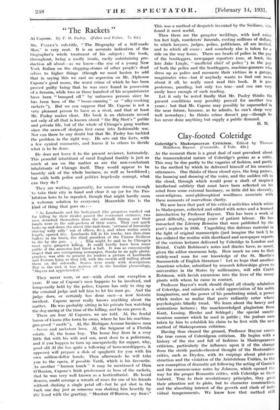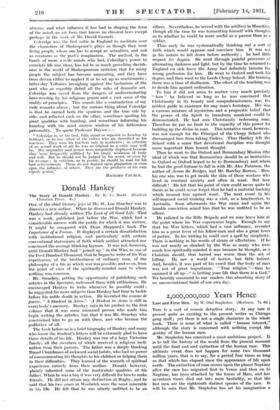Clay-footed Coleridge
AT the moment there is a great deal of cant prevalent about the transcendental nature of Coleridge's genius as a critic. This may be due partly to the vagaries of fashion, and partly to the method by which he delivered himself of his oracular utterances. One thinks of those closed eyes, the long pauses, the booming and dooming of the voice, and the sudden rift in the cloud, through which would pour a shaft of inspired intellectual subtlety that must have been reflected on his mind from some external luminary, so little did his slovenly, semi-religious, semi-philosophical woolliness associate with these moments of marvellous clarity.
We now have that part of his critical activities which relate to Shakespeare, collected and edited with notes and a learned introduction by Professor Raysor. This has been a work of great difficulty, requiring years of patient labour. He has ransacked the Literary Remains that were published by the poet's nephew in 1836. Ungarbling this dubious material in the light of original manuscripts (just imagine the task !) he has collated the residue with shorthand and newspaper reports of the various lectures delivered by Coleridge in London and Bristol. Crabb Robinson's notes and diaries have, as usual, given the editor enormous help. How much we owe to that widely-read man for our knowledge of the St. Martin's Summertide of English literature ! Let us hope that another American scholar, subsidized by research fellowships given to universities in the States by millionaires, will edit Crabb Robinson, with lavish excursions into the lives of the many giants with whom he came in contact.
Professor Raysor's work should dispel all cloudy adulation of Coleridge, and substitute a solid appreciation of his noble imagination, and the power of his penetrating mind, a power which makes us realize that poets radiantly enter where psychologists blindly tread. We learn about the heavy and sententious lectures ; the unacknowledged plagiarism from Kant, Lessing, Herder and Schlegel ; the special sancti- monious manner which he used in public ; the jealous care taken by him to establish his claim to be first with the new method of Shakespearean criticism.
Having thus cleared the ground, Professor Raysor erects the true canon of Coleridgean criticism. He begins with a history of the rise and fall of fashions in Shakespearean criticism, particularly the influence upon it of the change from the sterile pseudo-classical thought of the Restoration critics, such as Dryden, with its carpings about plot-con- struction and the violation of the Aristotelean Unities, to the new conception of dramatic art following the acting of Garrick and the common-sense notes by Johnson, which opened the way for the proper Romantic critics, with Coleridge as their Gabriel. True to their revolutionary principles, they gave their attention not to plots, but to character construction, and the absorbing interest of the growth and clash of indi- vidual temperaments. We know how that method still obtains, and what influence it has had in shaping the form of the novel, an art form that knows no classical laws except perhaps in the work of Mr. David Garnett.
Coleridge was the first critic in England to meditate over the characters of Shakespeare's plays as though they were living people, whom one has to accept as actualities, and not as creatures a the poet's imagination. The method, in the hands of more. s 'mile minds who lack Coleridge's power to correlate life ana ideas, has led to so much grovelling slavish- ness in the world of Shakespearean criticism that for many people the subject has become nauseating, and they have been driven either to neglect it or to set up as reactionaries ; latter-day Voltaires inveighing against the barbarism of the poet who so superbly defied all the rules of dramatic art. Coleridge was saved from the dangers of undiscriminating hero-worship by his religious genius and a vast sense of the reality of principles. This sounds like a contradiction of my rude remarks above ; but the curious thing about Coleridge
is that he carried both the spurious and the true side by side, and reflected each on the other, sometimes spoiling his great qualities with humbug, and sometimes informing his humbug with the most austere wisdom of his fathomless personality. To quote Professor Raysor :-
"Coleridge is, at his best, fully equal or superior to Lessing, to Schlegel, or to any other of the critics who are described as his teachers. They were his teachers only in aesthetics ; in criticism of an actual work of art he was as original as a critic may well be. His originality and power were irregularly displayed because they were frequently nullified by his tragic weakness of body and will. But he should not be judged by his worst, or even by his average ; in criticism, as in poetry, he should be read for his best achievements. Those do not depend upon plagiarism or even upon the influence of others. They are the products of his own superb genius."
RICHARD CHURCH.
















































 Previous page
Previous page